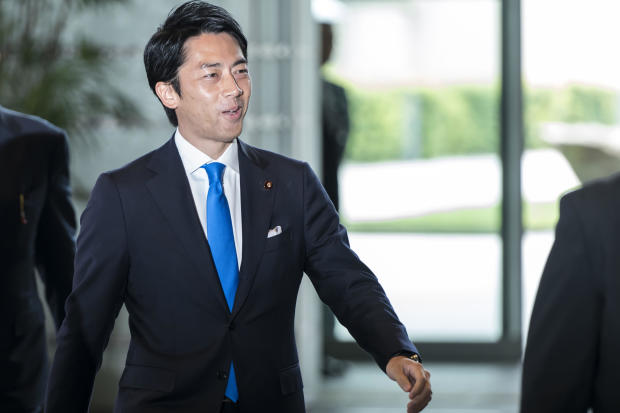Japanese official's decision to take paternity leave draws applause — and scorn
Tokyo — The Japanese public has largely applauded a headline-grabbing move by the country's environment minister this week: Shinjiro Koizumi, a photogenic 38-year-old politician sometimes touted as a possible future prime minister, announced that he will take two weeks of paternity leave after his wife gives birth to their first child.
The move is intended not just to let Koizumi help his wife out and allow him to experience the joys of fatherhood firsthand, but to make him something of a role model.
"My biggest wish is that the day will come when our society no longer deems a politician's childcare leave as news," Koizumi said. Many seemed inclined to agree.
"I wholeheartedly support him," Tokyo politician Hironobu Narisawa told the Asahi newspaper. "This will encourage other male employees."
"The feeling on the street is that it's about time someone in the government took paternity leave," said Kaori Shoji, a Japanese writer and mother. "And he had better change diapers and get up every two hours along with his wife, otherwise what's the point?"
Of 100 passersby interviewed by the Fuji TV network, 88 gave a thumbs-up to Koizumi's high-profile act of parenting. "If a government minister aggressively embraces childcare leave, it will make it easier for others to follow in his footsteps," one woman said.
But in this workaholic nation, which keeps slipping ever backward in global women's empowerment ratings, old habits die hard, and the impact of Koizumi's admittedly modest act of fatherhood is likely to be muted. That is all the more tragic because of Japan's unusually generous, but barely used, national paternity leave policy.
"Japan's childcare leave system is world-class," Yasuyuki Tokukura of the nonprofit group Fathering Japan, told TBS News. "But Japan's social climate hasn't kept pace, so the paternity leave system can't be put to good use."
The U.S. ranks dead last among 41 developed nations for parental leave; the government grants new dads zero time off. Japan guarantees each parent a full year off work, which can be extended up to one additional year. Moms and dads working for companies and the civil service are eligible for 67% of their salary for the first 180 days after childbirth, and half-salary after that to complete the year — paid for by taxpayers, not employers.
But despite this gold-plated childcare leave system, a paltry 6% of new dads took any paternity leave in fiscal 2018 – and the most common duration for those who did was just a few days. Japanese blame a workplace atmosphere that frowns on men using their legally mandated paternity leave.
Hostility toward news dads taking time off to help with childcare is so widespread and ingrained, it has a name: "pata-hara," or paternity harassment. (The female counterpart is "mata-hara.") Men who work reduced hours or refuse to put in overtime to help with childcare have been threatened with demotions, and may even return from time off to find they no longer have a desk.
Attitudes appear to be split along generational lines, with the heaviest pushback from middle-aged and older men.
"I don't think someone being paid by taxpayers should make a statement like this," grumbled one man in his 40s over Koizumi's move. "I've never seen a guy take childcare leave."
"Honestly, I just wish he'd do his job as minister," said another, older man.
Harrumphing was heard even from members of Koizumi's own conservative political party.
"He's smart, Minister Koizumi, so surely he won't let his time off negatively affect parliament business," said Hiroshi Moriyama, the 74-year-old Diet (congress) affairs committee chairman.
But surveys by the Japan Productivity Center and other organizations find new male graduates and fresh company recruits overwhelmingly in favor of paternity leave. Experts say management is the sticking point – and the key to de-stigmatizing leave-takers.
"To boost the adoption of paternity leave, the (boss's role) is extremely important," said advocate Tokukura, calling for more managers to understand and extol the value of paternity leave.
A handful of private Japanese companies have embraced paternity leave, including the Japanese unit of American insurer Aflac, which has about 5,000 employees here. Aflac sends emails to new dads — and their bosses — to prod fathers into taking their leave. Managers are evaluated on how well they implement paternity leave programs. The effort has paid off, with 70% of the company's dads now taking an average 10 days off.
A video promoting paternity leave, titled "I wish I had spent more time together with you," presents the regretful testimony of CEOs from seven other companies who talk about how they sacrificed home life for jobs. The CEOs beseech other men not to follow their example.
"I have almost no memories of my children before the age of 2," Tomoyuki Shigenaga, president of Pacific Consulting, says in the video, which was co-produced by Forbes Japan and consulting firm Work-Life Balance.
"My son's first word was 'mama,' I don't remember him learning to say 'papa,'" says Takumi Sakata, president of Sakata Manufacturing. "The era when a man's value was in how insanely long he worked — those days are long gone."
The video, uploaded to social media a few weeks before the minister's announcement, has been viewed more than 12,000 times.




